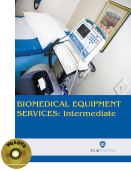Trade and Industrial Education

Biomedical Equipment Services: Intermediate comprehends various diverse practical and visual skills with knowledge of specialized materials and techniques. Medical equipment is designed to aid in the diagnosis, monitoring or treatment of medical conditions. This book will introduce the knowledge and skills for those studying and/or working in biomedical industry to interpret and convey information in response to workplace requirements.
About this Book
The information in this book consists of competencies that a person must achieve to install, perform corrective and preventive maintenance, repair biomedical equipment, assess and refer biomedical equipment.
About the Biomedical Equipment Service Industry Biomedical technicians contribute enormously to successful patient outcomes in healthcare by inspecting, repairing, calibrating and designing medical equipment that grows more advanced and vital all the time. Also called biomeds, biomedical engineers and biomedical equipment technicians (BMETs), these professionals have worked diligently for the past several decades in an area of medicine where science fiction becomes fact and present meets future. Their profession continually proves to be one of the most dynamic and exciting in healthcare. BMETs ensure the safety and proper functioning of medical equipment on which patients and healthcare professionals rely in order to achieve safe, accurate diagnosis and successful treatment. BMETs use their technological expertise to prevent mechanical and computer errors that could harm patients or lead providers to the wrong diagnosis. They also set up preventative maintenance programs to keep equipment running and prevent life-threatening breakdowns. Many facilities consult biomeds when choosing new machines and planning for the future. These technicians train medical professionals to use equipment safely and effectively. Hospitals depend on BMETs in order to meet local, state and federal regulations governing the use of medical equipment. Some BMETs are generalists who work with a multitude of machines, while others specialize in a narrower area such as imaging or laboratory devices. Biomedical technicians work in a variety of environments. Many are employed by hospitals and health systems. Others work in the supply end of the industry at medical equipment retail centers or wholesalers. According to the Bureau of Labor Statistics, 13 percent of BMETs were self-employed in 2010.
Most BMETs are employed full time. Technicians with wholesale and retail suppliers usually work regular business hours and may be on call some nights and weekends. In hospitals, BMETs often work evening and overnight shifts. A BMET career requires a two-year associate degree in biomedical equipment technology or a related field such as electronics or engineering. Because technology advances quickly, BMETs must constantly update their skills through continuing education.